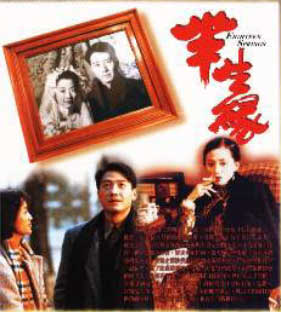Eighteen Springs

Reviewed by YTSL
This 1997 Hong Kong filmic adaptation of an Eileen
Chang novel about "romance and fate" (according to Shelly Kraicer) strikes
me as being very much more akin to the kind of Mainland Chinese presentations
that often get critically acclaimed and shown in art-houses in "the West"
(and, not unrelatedly, banned in their homeland). While some might
consider this to be high praise, I do not mean for it to be the case.
Rather, even while I would not argue against its being so that these works
usually can boast of having high production values, beautiful cinematography
and good acting, the fact of the matter is that this (re)viewer often comes
out of the viewing experience feeling emotionally drained, depressed, traumatized
and despairing that there is any good in the world (not least, that of the
foreign -- for most of us -- one depicted in these efforts). As such,
they are films I often regret having watched and would not recommend to too
many others.

EIGHTEEN SPRINGS shares with every other Ann Hui-helmed work that I have
seen -- the last of which, prior to this, was "Starry is the Night" -- the
faults of being too deliberate and heavy-handed in its approach to its story
along with possessing an incredibly unsympathetic view of people and a pessimistic
perspective of life in general. In all honesty, upon my latest encounter
with this all too familiar combination, I felt like screaming out loud in
some agony and frustration: "Enough already, we get it (that we can't
alter the fact that life is not a bed of roses), okay?!" And, believe
me, if I ever got any guarantee that the respected (but surely not loved?)
director -- or the financial backers of her films -- was within earshot,
I would do so without much reservation at all!

Watching the first half hour or so of this 125 minute length period piece
(which is set for the most part in 1930s Shanghai but also features scenes
which take place in Nanjing and a decade or so later), I nursed some hope
that this might be the first Ann Hui movie I might actually enjoy viewing.
As it was, EIGHTEEN SPRINGS starts off promisingly with a pleasantly innocent-feeling
-- yet evocative -- introduction to the movie's two protagonists (who narrate
their tales as well as appear in what seems almost like reenactments of them):
A capable and pleasant young woman named Gu Manjing (portrayed by the immensely
winning Wu Chien-Lien); and a shy but sweet man (the character of Shen Shujun
is of the kind which Leon Lai is very well suited to play); colleagues at
a factory (she does office work; he's an engineer), like the mutual friend
(played by Wang Zhiwen) who finally got the exchangers of surreptitious and
admiring glances talking to each other.

Upon the film's expanding its focus to encompass Manjing and Shujun's relatives
though, whatever sense of well being there was starts to crack, shatter and
dissolve. Though those two individuals are shown to love their family,
what you see much more is how flawed those kinfolk all are (and I include
here not only Manjing's luxury-loving "hostess" elder sister -- Anita Mui
in brittle as well as flamboyant Diva mode -- and her husband (played by
Ge You) but also the old biddy relations among both the Shen and Gu clans).
Consequently, when bad things start to happen to Manjing and Shujun (actually,
in keeping with its being an Ann Hui movie, much worse things happen to the
female than male main character), you know that they will come from within
rather than outside of their family circles.

It is one of the absolute tortures of watching EIGHTEEN SPRINGS (and, likewise
the previously mentioned 1988 offering starring the incomparable Brigitte
Lin; ditto "Ah Kam" which features a still too rare dramatic performance
by Michelle Yeoh) that the viewer gets saddled with a most unpleasant foreboding
of the horrors that will come for what seems like an unspeakably long age
before those events slowly and excruciatingly unfold in front of his or her
eyes. Adding salt onto one's wounds is that there is no cathartic release
whatsoever at any point in the film, not least the concluding section which
really just tapers off rather than finishes with some kind of bang or --
at least -- meaningful point being made. Instead, one is provided only
with a pathetic resigned suggestion that if events had happened as idealized
and planned, there wouldn't have been a story to tell. Maybe it really
is the case that "happy endings" are considered to not be very Chinese (as
can be witnessed by this phrase being sarcastically uttered in English --
rather than Cantonese -- in quite a few Hong Kong movies (E.g., "Black Cat")).
For my part though, not only would I beg to differ with this opinion but
also suggest that it would have made for a better and at least less predictable
Ann Hui cinematic offering if it had been allowed to be so.
My rating for the film: 5.5
N.B. - Anita Mui won the HK Film Awards
Best Supporting Actress and Wu Chien-lien won the HK Film Critic Society
Best Actress Award.





